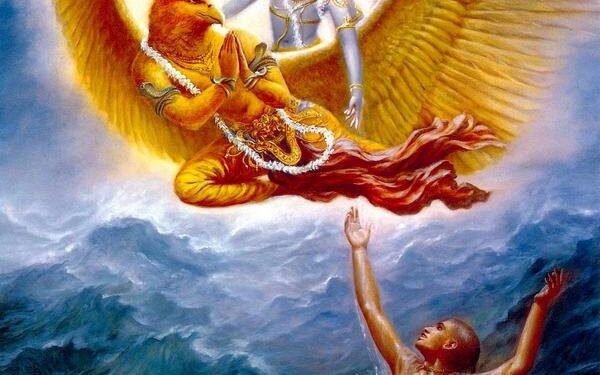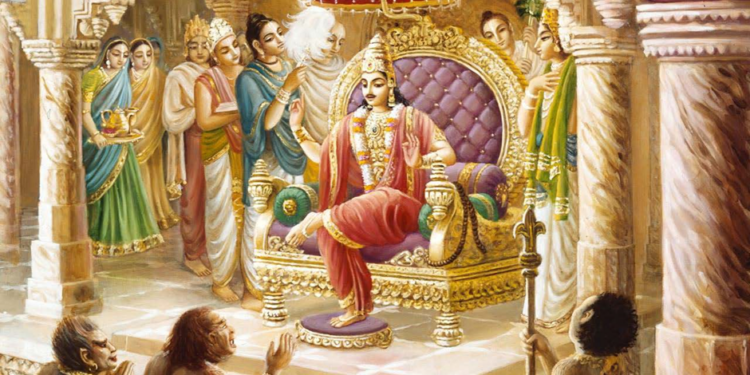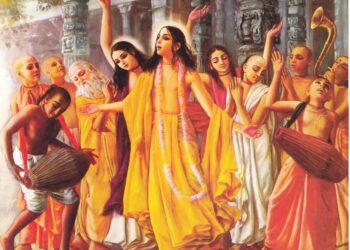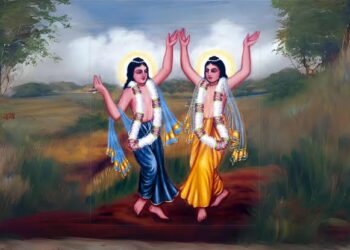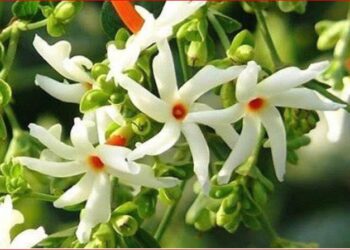1.113.47. O Saunaka, the living beings arise from the unmanifest; at their death they dissolve themselves in the unmanifest. In between they remain manifest. What is there to lament over?
1.113.48. If the time of death has not been reached no one dies even if pierced with a hundred arrows. If the same has arrived he does not survive even a slight prick with the tip of a kusa grass.
1.113.49. A man gets only those things he is destined to get; he goes only to those places where he has to go (at the behest of karma) and whether misery or pleasure he gets only what he has to get.
1.113.50. A man gets things from karma only. Why should he shout and cry? Even if prodded, flowers and fruits do not transgress their stipulated time (they do not come out earlier or later). So is the case with karma of the previous birth.
1.113.51. Neither conduct, nor parentage, neither learning, nor knowledge, neither the qualities, nor the purity of seed fructifies in man. As in the case of trees, good deeds acquired by austerities fructify in men.
1.113.52. A man meets with death where there is a slayer or riches where there is plenty. Goaded by karma a man goes to the respective places.
1.113.53-56. Just as a calf can recognize its mother in the midst of a thousand cows, the previous karma approaches the doer. Enjoy your merits, o fool! Why should you feel aggrieved? What you do now will certainly follow you hereafter whether good or bad.
1.113.57. The vicious and the mean observe other’s faults, be they so little as the mustard seeds. They see but pretend not to see their own faults as big as bilva fruits.
1.113.58. O brahmana! Nowhere can they find happiness, who are defiled by lust and hatred. After careful consideration I see that there is pleasure where there is enlightened bliss.
1.113.59. Attachment is a cause of misery; since apprehension follows in the wake of attachment. If, therefore, attachment is eschewed one should be happy.
1.113.60. The body is the base for misery and happiness. Life and body are born together.
1.113.61. Pleasure and pain can be defined briefly. Whatever goes in the possession of others is misery, whatever remains in one’s possession is pleasure.
1.113.62. After pleasure comes the pain and after pain comes the pleasure. Pleasure and pain whirl like wheels in human life.
1.113.63. What has passed has gone forever; if anything is to happen it is still far off. He who minds the present alone is not afflicted by sorrow.
Suta said:
1.114.1. None is friend or enemy to any other person by nature. Friendship and enmity arise from special causes.
1.114.2. The two syllables “mitram” (friend) signify solace in sorrow, freedom from fear and preservation of love and confidence. By whom has this jewel been created?
1.114.3. If anyone says for once the two letters “Hari” he has everything made ready for his journey to salvation.
1.114.4. Men cannot have as much confidence in mothers, wives, brothers or sons as in a friend of kindred nature.
1.114.5. If you wish for a prolonged friendship, avoid the following three, gambling with him, monetary transactions with him and seeing his wife in his absence.
1.114.6. One should not sit in the same seat with one’s mother, sister and daughter in an isolated place. The powerful sense organs can drag even an erudite man (into the mire of lust). What of common men?
1.114.7. God of love compels persons to turn their attention to such spots as provide risks, death and punishments and not to one’s own? [i.e. People do not love their wives but run after other women risking even death].
1.114.8. It is easier to gauge the velocity of the hailstorm at the time of the final dissolution, the speed of the racing horse and the depth of the great ocean than the heart of the person who does not love.
1.114.9. O Saunaka, if there is no opportune moment, if there is no privacy and if there is no one to make overtures women shall preserve chastity.
1.114.10. She serves one man but cherishes love for another. In the absence of man a woman can very well be chaste.
1.114.11. A mother moved by passion may commit some misdeeds. Though the sons may disapprove of the conduct yet they shall not worry much about them.
1.114.12. The body of a courtesan is prized in the world; the body that is held at stake always with the neck torn by the hoofs of debauches and hence always agitated and anxious. Her sleep is dependent on others’ convenience; she has to follow the wishes of others and without a show of sorrow she has to laugh and sport always.
1.114.13. Fire, water, women, fools, serpents and royal households – these are to be resorted to by others always, yet they take away one’s life all of a sudden.
1.114.14. What is there to wonder at, if a brahmana well versed in grammar becomes a great scholar? What is there to wonder at, if a king well versed in polity and administration becomes a virtuous king? What is there to wonder at, if a young woman endowed with beauty and charms errs from chastity? What is there to wonder at, if a poor man begins to commit sins sometimes?
1.114.15. Do not allow others to see your vulnerable points; but note others carefully like a tortoise that keeps all its limbs safe in its shell.
1.114.16. Women may be confined to the nether worlds or may be imprisoned with high walls all round. Still if there is no moving glossy tuft of hair who can see them? [Using her long tresses she will escape from these places].
1.114.17. One’s own kinsman pursuing the same activities and knowing his vulnerable points is the fiercest foe. Even an enemy standing outside cannot injure so much.
1.114.18. He is the real scholar who pleases children with sweets, the good people with humility, the women with wealth, the deities with penance and people [by work] for their welfare.
1.114.19. They are not wise who try to win over a friend by deception, to secure virtue through sins, to attain wealth by harassing others, to learn with pleasure and to secure a lady’s love through harshness.
1.114.20. Even a pure action may be defiled and defective when the root is cut off. It is only the senseless man who will cut off a tree laden with fruits in order to secure the fruits.
1.114.21. O brahmana, I do not believe that a man with necessary things can become a saint even if he tries. How can a woman drinking wine be chaste as well?
1.114.22. One shall not place trust in a person not trustworthy. Even friends are not to be trusted. Some time later if he is angry the friend may publicise his secrets.
1.114.23. A general confidence in all living beings is sattvika but the main characteristic of a saintly man is to keep his feelings a secret forever.
1.114.24. Whatever action is done it follows the doer. Whatever may be your action, do not leave off your courage and intellect.
1.114.25. An intelligent man shall avoid these six: old women (for sexual purposes), fresh wine, dry meat, carrot, curd in the night and sleep during the day.
1.114.26. To a poor man a party of guests is poison (involving expenses); to an old man a woman in the prime of her youth is poison; an ill assimilated knowledge is poison; eating before digestion is poison.
1.114.27. To a man of undaunted spirit honour is pleasing; overthrow of administration is pleasing to the vile; to a poor man a charitable gift is pleasing and a woman in the prime of her youth is pleasing to a young man.
1.114.28. The six main reasons for sickness in men are: excessive drinking of water; eating hard indigestible foodstuffs; wastage of semen virile; holding up of faeces and urine (not evacuating them immediately); sleep during the day and keeping awake at night.
1.114.29. Early morning rays of the sun, excessive indulgence in sexual intercourse, the smoke column rising from the cremation ground, warming of the palms and the constant sight of the face of a woman in her menses – all these reduce the longevity of a man.
1.114.30. The following six take away one’s life immediately: dry meat, old women (if cohabited with), the early morning sun, very sour curd, sleeping and having sexual intercourse in the morning.



